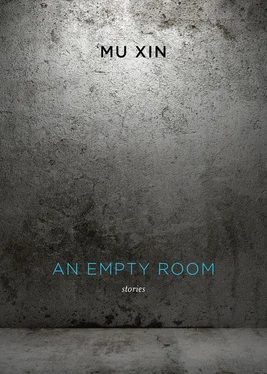Mu Xin - An Empty Room
Здесь есть возможность читать онлайн «Mu Xin - An Empty Room» весь текст электронной книги совершенно бесплатно (целиком полную версию без сокращений). В некоторых случаях можно слушать аудио, скачать через торрент в формате fb2 и присутствует краткое содержание. Год выпуска: 2011, Издательство: New Directions, Жанр: Современная проза, на английском языке. Описание произведения, (предисловие) а так же отзывы посетителей доступны на портале библиотеки ЛибКат.
- Название:An Empty Room
- Автор:
- Издательство:New Directions
- Жанр:
- Год:2011
- ISBN:нет данных
- Рейтинг книги:3 / 5. Голосов: 1
-
Избранное:Добавить в избранное
- Отзывы:
-
Ваша оценка:
- 60
- 1
- 2
- 3
- 4
- 5
An Empty Room: краткое содержание, описание и аннотация
Предлагаем к чтению аннотацию, описание, краткое содержание или предисловие (зависит от того, что написал сам автор книги «An Empty Room»). Если вы не нашли необходимую информацию о книге — напишите в комментариях, мы постараемся отыскать её.
In Our Time
An Empty Room
An Empty Room — читать онлайн бесплатно полную книгу (весь текст) целиком
Ниже представлен текст книги, разбитый по страницам. Система сохранения места последней прочитанной страницы, позволяет с удобством читать онлайн бесплатно книгу «An Empty Room», без необходимости каждый раз заново искать на чём Вы остановились. Поставьте закладку, и сможете в любой момент перейти на страницу, на которой закончили чтение.
Интервал:
Закладка:
I remember our winter vacations — snow in the ancient village, the opera singing during temple festivals — everything was joyful while we spent the New Year with Mother. During our summer vacations, my sister and I would travel by boat and train to the city. Father would let us stay in the extravagant hotel he owned and managed. My sister was a smart girl, and brave, too. She would always explore the vicinity of the hotel to find open areas for us to play, expanding our territory. Everyone in the hotel, from upper management to the staff, took care of us. Everything we asked for, though we hardly asked, was provided. Father seemed to think that nothing could go wrong. He barely had time for us anyway. It was Miss Xia who would come in her car to see us and take us to her villa for dinner. She had all kinds of questions for us, and if our conversation went well, she would ask us to call her “Second Mother.” Sister and I would just smile and look at her. It wasn’t that our mother had told us not to call her that — we just felt uncomfortable. Everything about her was enchanting: her European-style beauty, her good manners, her amiable personality, her hospitality. But there was only one mother for us and we couldn’t accommodate a second one. Plus, she didn’t look anything like our mother. She looked more like, well, a flower. Sister and I would sometimes make faces behind her back, and call her “a social flower,” knowing it wasn’t very nice of us to say that. Sister told me that Miss Xia was a top graduate of Zhejiang-Jiangsu (Z-J) Academy of Physical Sciences. “Top graduate” I understood. Apparently she was one of three with the highest GPA. But I had only heard about a certain Z-J governor by word of mouth, never a Z-J Academy of Physical Sciences. Sister told me that in the Academy, which was run by both Zhejiang and Jiangsu provinces, Miss Xia was also a star swimmer and a star tennis player. Suddenly my esteem of Miss Xia ballooned. But this esteem quickly deflated when I learned of a different title she possessed. “Do you remember that huge beauty salon across the street?” Sister once said. “Well, Miss Xia is the lady boss of the White Rose Beauty Salon.” I hated all lady bosses. So every time I saw her, I tried to secretly tell which of her gestures and smiles were those of a lady boss and which of a star athlete, until I got confused and tormented by my lack of insight. Why care? Sister said. I just eat the yummy roast duck liver she brings and wear the skirts she buys; it’s dad’s money anyway. I, too, ate the duck liver; I also wore strap pants and leather boots — all purchased with father’s money. (But it was Miss Xia who took us to the store, made selections for us, and had our clothes custom made. If we had gone on our own, the store owner wouldn’t have been so patient in letting us try them on so many times. He even sent our new purchases to the hotel.) As soon as we stepped into the store, Miss Xia would say, “You like this kind of leather boot, don’t you?” It was amazing. I felt pleased and would ask her, “How did you know?” “You look really handsome in them, like a military officer.” I was won over as she knew my thoughts. She also knew Sister’s thoughts. Miss Xia envisioned her as a young dancer, and had many dancing costumes of light gauze made for her, each outfit arriving one after another like a magician’s trick. I almost complained that I couldn’t be a girl. Since soft dancing steps weren’t my style, I clicked my boots to make loud sounds. If we were walking on the road, I certainly attracted more attention than Sister.
As our first summer vacation came to an end, Father bought us a lot of stationery, toys, candies, and cookies, as well as a box of gifts for Mother. “I’m sorry that I haven’t been able to keep you company,” he said. “Well, did you have a good time anyway?”
“Not bad,” I replied.
“What do you mean, ‘not bad’?”
“I mean it was OK.”
“You are trying to avoid saying ‘good,’ aren’t you?”
“It was quite good,” I said.
“It was very good,” Sister joined in. “We had a wonderful time.”
Father lit a cigar and sat down. “If your mother asks the same question, you should say ‘Quite good,’ right?”
“We will,” Sister replied. I nodded in agreement.
Father pulled me close to his chest, kissed me and whispered, “You’re angry with me. That is why I like you.”
During the journey home by train and boat, we talked about what we should say and not say in case Mother asked, as she certainly would. The horse race and dog race, skating, Chaplin, Uncle Hai Jing — these things we could report. Crystal lights in the villa, silver table tops, Miss Xia singing and playing piano, diamond necklace — no report. Persian carpets, clumsy clocks made in England, a marble child peeing — no report either. What about the beauty salon? Mother would stay in the hotel if she visited, and would also go to the salon, but wasn’t likely to ask, “Who is your lady boss?” I agreed with Sister. We were two children who didn’t understand much about values or politics, but we followed our instincts: we tried to stay loyal to Mother without betraying Father.
That evening when we came home, Mother opened the gift box. Both Sister and I were surprised to see how much the box could hold, and were also happy to see Mother try on the clothes. A thought flashed across my mind: It was Miss Xia who had chosen everything! All the cosmetics were ample supply for a makeup artist. There was also a bottle of skin-clarifying cream, so I asked, “Ma, do you have freckles?”
Mother showed me her hand and said, “Look at that. Strange I should have freckles on the back of my hand. I didn’t even notice them until recently.”
As children, we simply believed that every year there would be a summer vacation; every year Father would welcome us to his hotel; every year Mother would wait for our return; everything would be like the oval red-oak table in the family room, lasting forever and ever. We never thought that lightning and thunder could tear through a clear sky. But it did: Father suddenly died, one year before the outbreak of the Pacific War. Then the family began to decline. Later, as we fled during the war, Mother often mumbled, “It’s good he left before this. He doesn’t have to suffer like a refugee.”
Soon after Father’s death, Miss Xia returned to our ancient village, which was also her hometown. Her parents had died a long time ago. Her three brothers had neither property nor occupation but were dressed extravagantly like country gentleman. The locals were baffled by this and guessed they were involved in some kind of criminal activity. Miss Xia’s given name was Mingzhu, which means “bright pearl,” but somehow her nickname was “night pearl.” Her homecoming was big news — the rumor spread that the night pearl was shattered and could shine no more.
As if Father’s death wasn’t bad enough, Miss Xia’s bad luck deepened when she offended a very important lady boss of a foreign company. She couldn’t take it anymore and came home defeated. That she even moved her furniture and piano home indicated that she would be staying a long time. Miss Xia was a delicate beauty who belonged to the bustling world and seemed out of place in an old village. She had long been damned by various rumors spread by those local “respectable elements” who said that she had brought shame to the village and had ruined its reputation. People said that Xia Mingzhu avoided seeing anyone and lived like a woman with her face behind a veil. When we heard this, my mother said in a flat tone, “She deserves it.”
Mother wouldn’t even consider that Xia Mingzhu returned to her hometown as a result of a life-changing epiphany; instead, she thought Miss Xia’s misfortune and her loss of dignity were her own fault.
Читать дальшеИнтервал:
Закладка:
Похожие книги на «An Empty Room»
Представляем Вашему вниманию похожие книги на «An Empty Room» списком для выбора. Мы отобрали схожую по названию и смыслу литературу в надежде предоставить читателям больше вариантов отыскать новые, интересные, ещё непрочитанные произведения.
Обсуждение, отзывы о книге «An Empty Room» и просто собственные мнения читателей. Оставьте ваши комментарии, напишите, что Вы думаете о произведении, его смысле или главных героях. Укажите что конкретно понравилось, а что нет, и почему Вы так считаете.












